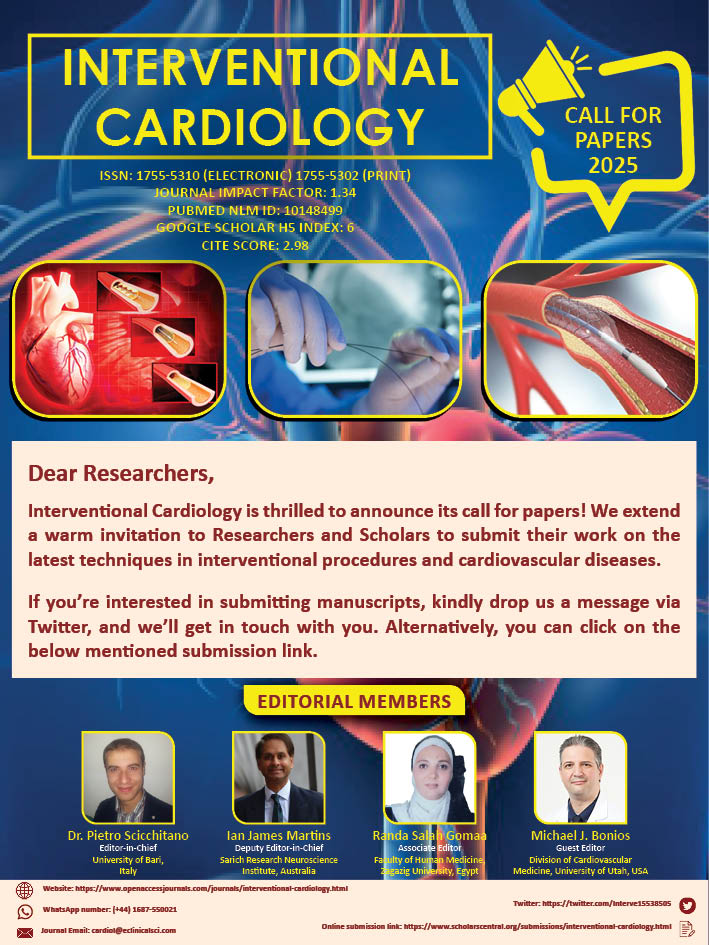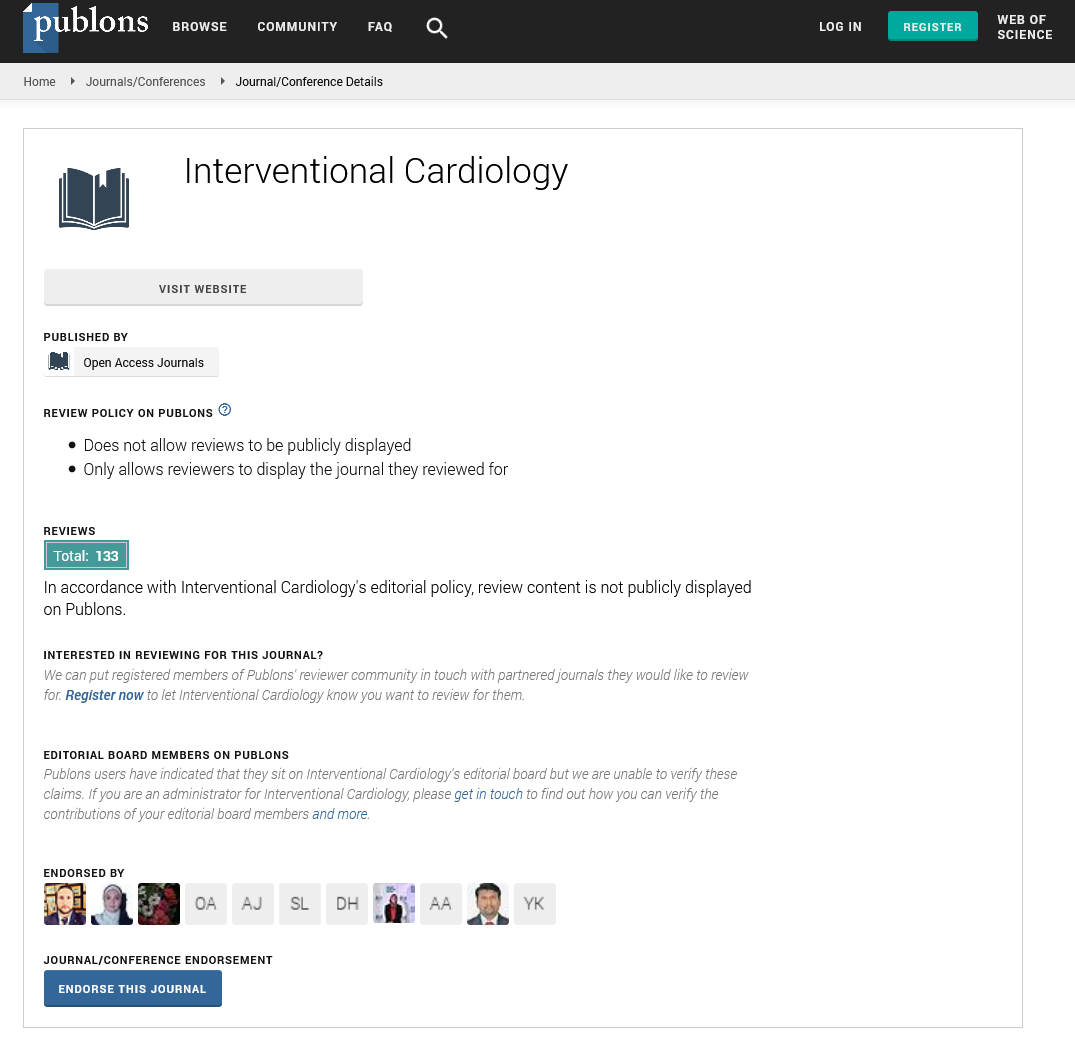Short Communication - Interventional Cardiology (2023) Volume 15, Issue 4
Pre-race aspirin to attenuate the risk of marathon-related cardiac arrests
- Corresponding Author:
- Arthur J Siegel
Division of General Internal Medicine, Massachusetts General Hospital, Boston, USA,
E-mail: asiegel@mgh.harvard.edu
Received date: 31-Jul-2023, Manuscript No. FMIC-23-108523; Editor assigned: 02-Aug-2023, PreQC No. FMIC-23-108523 (PQ); Reviewed date: 17-Aug-2023, QC No. FMIC-23-108523; Revised date: 24-Aug-2023, Manuscript No. FMIC-23-108523 (R); Published date: 01-Sep-2023, DOI: 10.37532/1755-5310.2023. 15 (4).749
About the Study
The cardio protective benefit of exercise is “dose-dependent”: The more you do, the lower your lifetime risk of major acute cardiac events including sudden death [1]. Many middle-aged males (including interventional cardiologists) may undertake endurance exercises such as running marathons, hoping to maximize their heart health.
The caveat, however, is “except while you are doing it”, as episodes of strenuous physical exertion transiently increase the risk of sudden cardiac death [2]. ‘Aye, there is the rub’, as Hamlet said, capturing this counterintuitive paradox of endurance sports. Reconciling the ambiguity that marathon training likely prolongs life but running such races may cut it short is possible by connecting the dots from the research of my esteemed colleagues and mentors to observational studies of my own in middle-aged Boston marathon physician-runners.
While the cardiac arrest risk of recreational road races in the United States of America since 2000 was low (0.8 per 100,000), the Race-Associated Cardiac Arrest Event Registry (RACER) study showed that the male gender and the marathon were significant and independent risk factors for such events, which increased in frequency during the study [3]. Fifty-nine such events in runners with an average age in their mid-40s no doubt represent excess premature cardiovascular morbidity and mortality, which was confirmed in a collateral study showing that the main cause of death during marathons was atherosclerotic coronary heart disease in middle-aged men [4].
Observational studies in asymptomatic middle-aged male Boston Marathon physician- runners demonstrated that inflammation consequent to exertional rhabdomyolysis after ‘hitting the wall’ activated atherothrombosis with a post-race hemostatic imbalance including procoagulant effects such as in vivo platelet activation [5,6]. Biomarkers in these subjects showed a “cytokine storm” with increased cardiac troponins, resembling findings in patients with acute myocardial infarction.
Pre-race low-dose aspirin has been recommended for enhanced primary prevention of the transiently increased race-related risk of cardiac arrest based on evidence in two randomized prospective clinical trials showing significant reductions in major acute cardiac events in apparently healthy men and those with moderate risk factors for coronary heart disease [7,8].
Coronary artery calcium scoring for middle-aged male marathon runners has additionally been recommended, which reliably stratifies risk for major acute cardiac events including sudden cardiac death [9]. Determination of coronary calcium burden by coronary CT scanning should therefore guide pre-race low-dose aspirin use, likely minimizing the risk for cardiac arrest for scores incrementally greater than zero. [10,11].
Take-aways for middle-aged male marathon runners including interventional cardiologists might be summarized as follows:
• Coronary atherosclerosis in middle-aged men is the main cause of marathon-related death.
• Strenuous exercise such as marathon training is cardio- protective overall but promotes (rather than prevents) the progression of coronary atherosclerosis (a 180-degree paradigm shift).
• High-intensity exercise such as running marathon races transiently increases the risk for cardiac arrest
• Coronary artery calcium scoring reliably stratifies the benefit of pre-race aspirin for enhanced primary prevention of the above.
• Aspirin is evidence-based to reduce major acute cardiac events in healthy men and persons with moderate risk in two randomized controlled clinical trials.
• Aspirin confers the additional benefit of having on board an agent with a class 1A recommendation from the American Heart Association for pre-hospital administration in the event of a race-related acute coronary syndrome.
While the strategic deployment of capabilities for efficient cardiac resuscitation along race routes has decreased fatalities [12], interventional cardiologists play a strategic role in saving the lives of runners with race-related acute coronary thrombosis or following successful cardiopulmonary resuscitation post-cardiac arrest. Male interventional cardiologists who run marathons should be cognizant of the risk of cardiac arrest during races and undergo coronary artery CT scanning for reliable risk stratification. Pre-risk low-dose aspirin is recommended for consideration by those with scores greater than zero to minimize their own risk and to preserve their skill set for saving the lives of others when such services are needed during races (see attached cartoon).
In conclusion, the key question for middle-aged male marathon runners: Do you know your coronary artery calcium score? The answer reliably stratifies the benefit of prerace aspirin for reducing the transiently elevated risk for cardiac arrest during races. Such usage is prudent for any runner with a coronary artery calcium score above 0 in the absence of clinical contraindications.
References
- Lee DH, Rezende LFM, Joh HK, et al. Long-term leisure-time physical activity intensity and all-cause and cause-specific mortality: A prospective cohort of US adults. Circulation. 146(7):523-534 (2022).
- Franklin BA, Thompson PD, Al-Zaiti SS, et al. Exercise-related acute cardiovascular events and potential deleterious adaptations following long-term exercise training: Placing the risks into perspective-an update: A scientific statement from the American Heart Association. Circulation. 141(13):e705-e736 (2020).
- Kim JH, Malhotra R, Chiampas G, et al.Race-Associated Cardiac Arrest Event Registry (RACER) study group. N Engl J Med. 366(2):130-140 (2012).
- Matthews SC, Narotsky DL, Berbholt DV, et al. Mortality among marathon runners in the United States, 2000-2009. Am J Sports Med. (2012).
- Siegel AJ, Stec JJ, Lipinska I, et al. Effect of marathon running on inflammatory and hemostatic markers. Am J Cardiol.88:35-37 (2001).
- Kratz A, Wood MJ, Siegel AJ, et al. Effects of marathon running on platelet activation markers: Direct evidence for in vivo platelet activation. Am J Clin Pathol.125:296-300 (2006).
- Long-term leisure-time physical activity intensity and all-cause and cause-specific mortality: A prospective cohort of US adults
- Polypill plus aspirin reduces incidence of cardiovascular events by 31%: TIPS-3. Cardiovasc J Afr. 32(1):32 (2021).
- Razavi AC, Iftekar SM, Zeina AD, et al. Coronary artery calcium for risk stratification of sudden cardiac death: The coronary artery calcium consortium. J Am Col Cardiol Img. 15(7):1259-1270 (2022).
- Siegel AJ. Pre-race aspirin for enhanced primary prevention of marathon-related cardiac arrests: Confronting Pheidippides’ legacy. Am J Med.136 (7) (2023).
- Siegel AJ. Pre-race aspirin to attenuate the risk for marathon-related cardiac arrest: Deconstructing the legacy of Pheidippides. Europ Heart Journal (2023).
- Shirakawa T, Tanaka H, Kinoshi T, et al. Analysis of sudden cardiac arrest during marathon races in Japan. Internat J Clin Med. 8:472-480 (2017).

